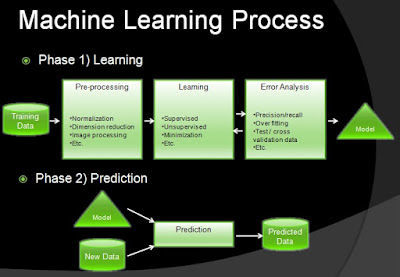Key term in supervised machine learning
- Labels
- Features
- Examples
Labeled Examples
Unlabeled Examples - Models
- Classification
- Regression
Labels in supervised machine learning
A label is anything which we are going to predict. For
example in mathematics if we are going to find or predict out the y value than
here the label is y. Similarly the future price of gold is a label. In email
filtering the label might be span or not span. In simple words the label is
what? that we are trying to predict.
Features in supervised machine learning
The features are the way that we represent our data. In
other words a feature is an input variable. For example if we look into email
example than feature might be the words of email, or, to or from addresses. The
feature is any piece of information that we want to extract from data or in our
case email to represent in supervised machine learning system.
In a simple machine learning project there are only single
feature and in a complex machine learning project there are millions of feature
in single project.
Examples in supervised machine learning
In machine learning everything revolves around the data, and
an example is a particular instance of data. We can break examples into two
different categories. The first one is labeled examples and the other is
unlabeled examples.
- Labeled Examples
- Unlabeled Examples
Labeled Examples
Labeled examples: {features, label} : {x, y}
Let’s take a look an example to understand labeled examples.
In labeled examples we obtain labels for data by asking
humans to make judgments about unlabeled data for example
Does this image contains duck or hen
Whether the dot in x-ray is tumor or something else
In other words in labeled examples user actions are involved
to obtain label for a given piece of unlabeled data. For example user performs
some actions on email to mark as spam or not, and after obtaining labeled
dataset we use this information to train our supervised machine learning model.
Unlabeled Examples
An unlabeled examples contains only feature. There is no explanation
for each piece of unlabeled data it just contains the data, and nothing else. Basically
unlabeled data consists of human created artifacts and we can obtain these from
world.
unlabeled examples: {features, ?}: (x, ?)
Once we have trained our machine learning model with labeled
examples, than we use that model to predict the label on unlabeled examples.
Models
Let's understand supervised machine learning model with an
example. Suppose we have asked to create a system that answers the question
that an image has a dog or a cat. To give answer for that question we create a
model or teach a model in supervised machine learning. Finally we have a model
in that model we put the things that we are predicted. So in supervised machine
learning a model define the relationship between features and label. Supervised
Machine learning model life cycle has two phases.
- Training
- Inference
Training
Training phase is the creating or learning phase of the
model. In this phase we teach the model according to labeled examples. And
enable the model to learn the relationship between features and labels.
Inference
In inference we apply the trained model to unlabeled
examples and later used that trained model to predictions.
Regression
In supervised machine learning regression and classification
both related to predictions. In regression we predict a value from continuous
set of model or data on the other hand in classification we predict a value
from discrete set of data. The example of regression is the value/price of
house in a region, and the example of classification is "is this an image
of dog, cat or something else".
In my next article we will discussed about linear
regression.





0 Comments